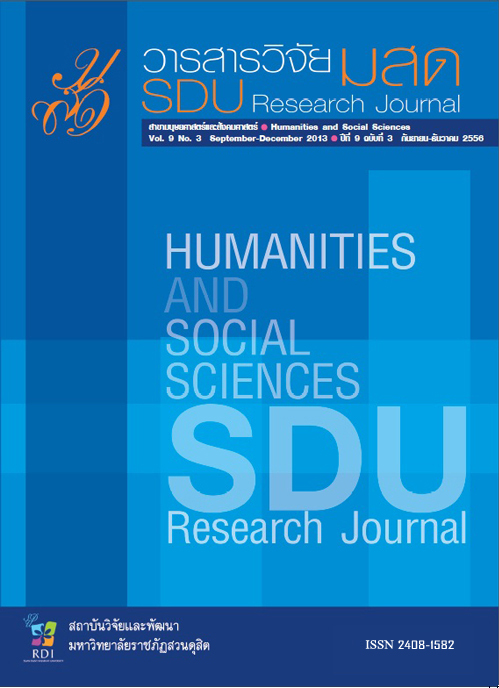การพัฒนาตัวชี้วัดการประยุกต์ใช้เศรษฐกิจพอเพียงของธุรกิจชุมชน: กรณีศึกษาหมู่บ้านโฮมสเตย์ จังหวัดหนองคาย
Keywords:
เศรษฐกิจพอเพียง, ธุรกิจชุมชน, หมู่บ้านโฮมสเตย์, จังหวัดหนองคายAbstract
บทคัดย่อ
การวิจัยครั้งนี้ใช้ระเบียบวิธีวิจัยเชิงคุณภาพ ในลักษณะกรณีศึกษา มีวัตถุประสงค์เพื่อพัฒนาตัวชี้วัดการประยุกต์ใช้เศรษฐกิจพอเพียงของธุรกิจชุมชนหมู่บ้านโฮมสเตย์จังหวัดหนองคาย ใช้วิธีการเก็บข้อมูลจากเอกสาร การสังเกต สัมภาษณ์เชิงลึก สนทนากลุ่ม และประชุมเชิงปฏิบัติการ ระยะเวลารวม 12 เดือน จากการวิจัย พบว่า ทางสายกลาง มี 11 ตัวชี้วัด ประกอบด้วย ประยุกต์ใช้สิ่งที่มี ผู้นำเข้มแข็ง ยึดคำสอนบรรพบุรุษ ซื่อสัตย์สุจริต ประหยัดอดออม สามัคคี เอื้อเฟื้อเผื่อแผ่ รักษาสิ่งที่มี ถนอมน้ำใจ มีเหตุผล และใช้จุดเด่นเป็นจุดขาย ความพอประมาณ มี 6 ตัวชี้วัด ประกอบด้วย กินอาหารพื้นบ้าน สร้างรายได้ ใช้ปุ๋ยคอกปุ๋ยชีวภาพ ปลูกผักสวนครัว ปลูกข้าวกิน และลดรายจ่าย ความมีเหตุผล มี 11 ตัวชี้วัด ประกอบด้วย สามัคคี เอื้อเฟื้อเผื่อแผ่ สืบสานประเพณี สร้างรายได้ ใช้เวลาว่างให้เกิดประโยชน์ ลดรายจ่าย ประยุกต์ใช้สิ่งที่มี เรียนรู้ ทำบัญชีครัวเรือน ประหยัดอดออม และเป็นแบบอย่างที่ดี การมีภูมิคุ้มกันในตัวที่ดี มี 12 ตัวชี้วัด ประกอบด้วย สามัคคี เอื้อเฟื้อเผื่อแผ่ ปลูกผักสวนครัว ปลูกข้าวกิน ทำบัญชีครัวเรือน กินอาหารพื้นบ้าน ใช้ปุ๋ยคอกปุ๋ยชีวภาพ บ้านเรือนสะอาดน่าอยู่ ครอบครัวอบอุ่น สุขภาพแข็งแรง ชุมชนเข้มแข็ง และสิ่งแวดล้อมดี เงื่อนไขความรู้ มี 8 ตัวชี้วัด ประกอบด้วย ประชุมอย่างต่อเนื่อง ใช้จุดเด่นเป็นจุดขาย แลกเปลี่ยนความรู้ ศึกษาดูงาน ยึดคำสอนบรรพบุรุษ เรียนรู้ ประยุกต์ใช้สิ่งที่มี และสืบสานประเพณี เงื่อนไขคุณธรรม มี 9 ตัวชี้วัด ประกอบด้วย มาตรฐานบริการ เอื้อเฟื้อเผื่อแผ่ ถือศีล ซื่อสัตย์สุจริต จริงใจ ทำกิจกรรมร่วมกัน เคารพนับถือ สามัคคี และสืบสานประเพณี ความสมดุลมั่นคงยั่งยืน มี 11 ตัวชี้วัด ประกอบด้วย สืบสานประเพณี ปลูกผักสวนครัว รักษาสิ่งที่มี สามัคคี สร้างรายได้ แลกเปลี่ยนความรู้ มีงานทำ ขยันอดทน ครอบครัวอบอุ่น ผู้นำเข้มแข็ง และสิ่งแวดล้อมดี
คำสำคัญ : เศรษฐกิจพอเพียง ธุรกิจชุมชน หมู่บ้านโฮมสเตย์ จังหวัดหนองคาย
Abstract
This study used qualitative research methodology. In the case study. Aims to development of indicators for applying Sufficiency Economy of community business of Home Stay village in Nong Khai province. The data collection from the document, observation, in-depth interviews, focus groups and workshop in the duration of 12 months. The findings of the study were as follows: Middle path: there were 11 indicators include things use applied, leadership forcefully, abide ancestor teach, honest, conserve and savings, harmony, charitable, treat things have, nourish kindness, reasonable and use highlights for Selling point. Moderation: there were six indicators include eat local food, make revenue, use manure and organic fertilizer, growing vegetables, crop to eat and reduce expenses. Reasonableness: there were 11 indicators include harmony, charitable, inherit tradition, make revenue, use vacation avail, reduce expenses, things use applied, learned, make household account, conserve and savings and good model. Self-immunity: there were 12 indicators include harmony, charitable, growing vegetables, crop to eat, make household account, eat local food, use manure and organic fertilizer, house clean, family snug, healthy, strong community and good environment. Conditions of knowledge: there were eight indicators include meeting continued, use highlights for Selling point, exchange of knowledge, observe activities, abide ancestor teach, learned, things use applied and inherit tradition. Conditions of morality: there were nine indicators include service standards, charitable, abide precept, honest, sincere, do activities together, respect, harmony and inherit tradition. Balance and sustainability: there were 11 indicators include inherit tradition, growing vegetables, treat things have, harmony, make revenue, exchange of knowledge, there work, Industrious, family snug, leadership forcefully and good environment.
Keywords: Sufficiency Economy, Community Business, Home Stay Village, Nong Khai Province.








